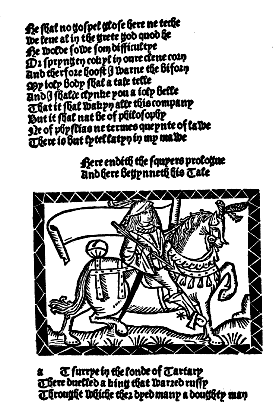What we call the beginning is often the end
And to make and end is to make a beginning.
The end is where we start from. And every phrase
And sentence that is right (…)
Every phrase and every sentence is an end and a beginning,
Every poem an epitaph. And any action
Is a step to the block, to the fire, down the sea’s throat
Or to an illegible stone: and that is where we start.from: LITTLE GIDDING, by T.S. Eliot
 Geoffrey Chaucer’s The Miller’s Tale is a bawdy Medieval narrative of double deceit and dirty tricks, populated by unsavory characters – not unlike the modern version unfolding in the federal courtroom in Washington. Perhaps it’s best to take Eliot’s advice literally, "The end is where we start from," or Chaucer’s, "here endith the farmers pologue And here Begynneth his Tale."
Geoffrey Chaucer’s The Miller’s Tale is a bawdy Medieval narrative of double deceit and dirty tricks, populated by unsavory characters – not unlike the modern version unfolding in the federal courtroom in Washington. Perhaps it’s best to take Eliot’s advice literally, "The end is where we start from," or Chaucer’s, "here endith the farmers pologue And here Begynneth his Tale."
Judith Miller is probably off the stage. It has ended. All of the drama has been played out – refusing to testify to the Grand Jury, spending three months in jail, Grand Jury testimony versions one and two, her less than graceful exit from the New York Times, the Miller Meltdown Moment on the stand yesterday. Was all of that drama in the service of some salient fact that she was trying to conceal, something she’s still hiding? Does she know something more about this case that actually matters? Or are the theatrics just her M.O. – a red herring?
Though it’s sexist-sounding, I’m going with drama is definitely her modus operandi. The very first time I saw her on T.V., she was making an animated speech to the staff of the New York Times after her release from jail [no longer on their server]. She was self important, "squeaky," gesturing, passionate, a monologue peppered with clever phrases. Her prewar articles read the same way – definite and strongly stated, though in retrospect, absolute malarkey. But it’s dangerous to make judgements about a person’s story based solely on character. In medicine, dramatic people often die from illnesses unseen because their caretakers are so put off by the histrionics.
I think she’s still hiding something. While it’s possible that it’s just something that would make her look bad, or stupid, I don’t think so. She’s been evasive in a very specific way – only willing to testify about Libby, doesn’t remember who else she talked to about the case, picky about every question, guarding any access to any other sources. I think that she had another source [or maybe even other contacts with Libby], someone who fed her information before the war for her baloney articles. I think that during the period in question, she talked to that other source about the Plame story, about the "cover-up." I doubt she was protecting Libby in the first place. She certainly wasn’t today. It was his lawyer who was impeaching her. I think it was someone else – her version of "Deep Throat." Maybe it doesn’t matter in this case, but it matters somewhere or she wouldn’t be acting like such a squirrel [then, too, maybe I read too many beach mysteries this summer].
So, perhaps this is not the end of Judith Miller after all. Maybe it’s a new beginning…
: )
So glad you’re back, M.